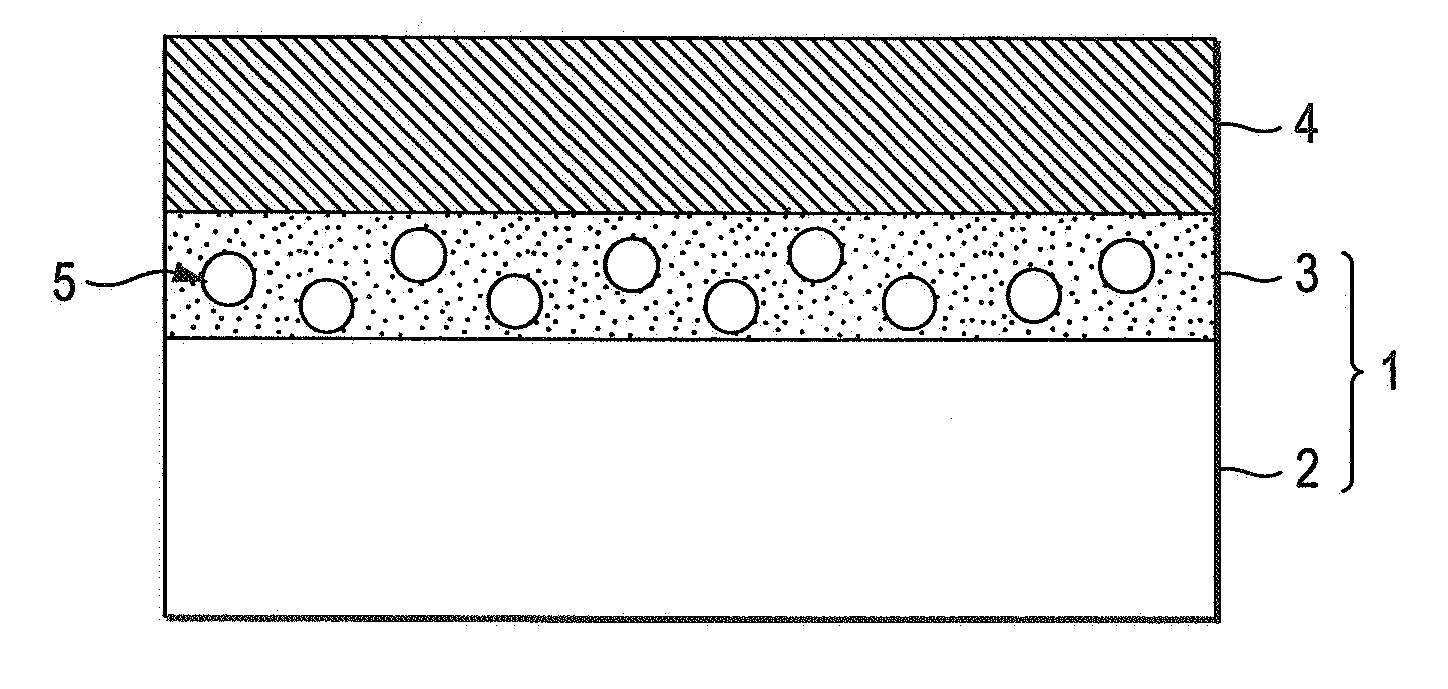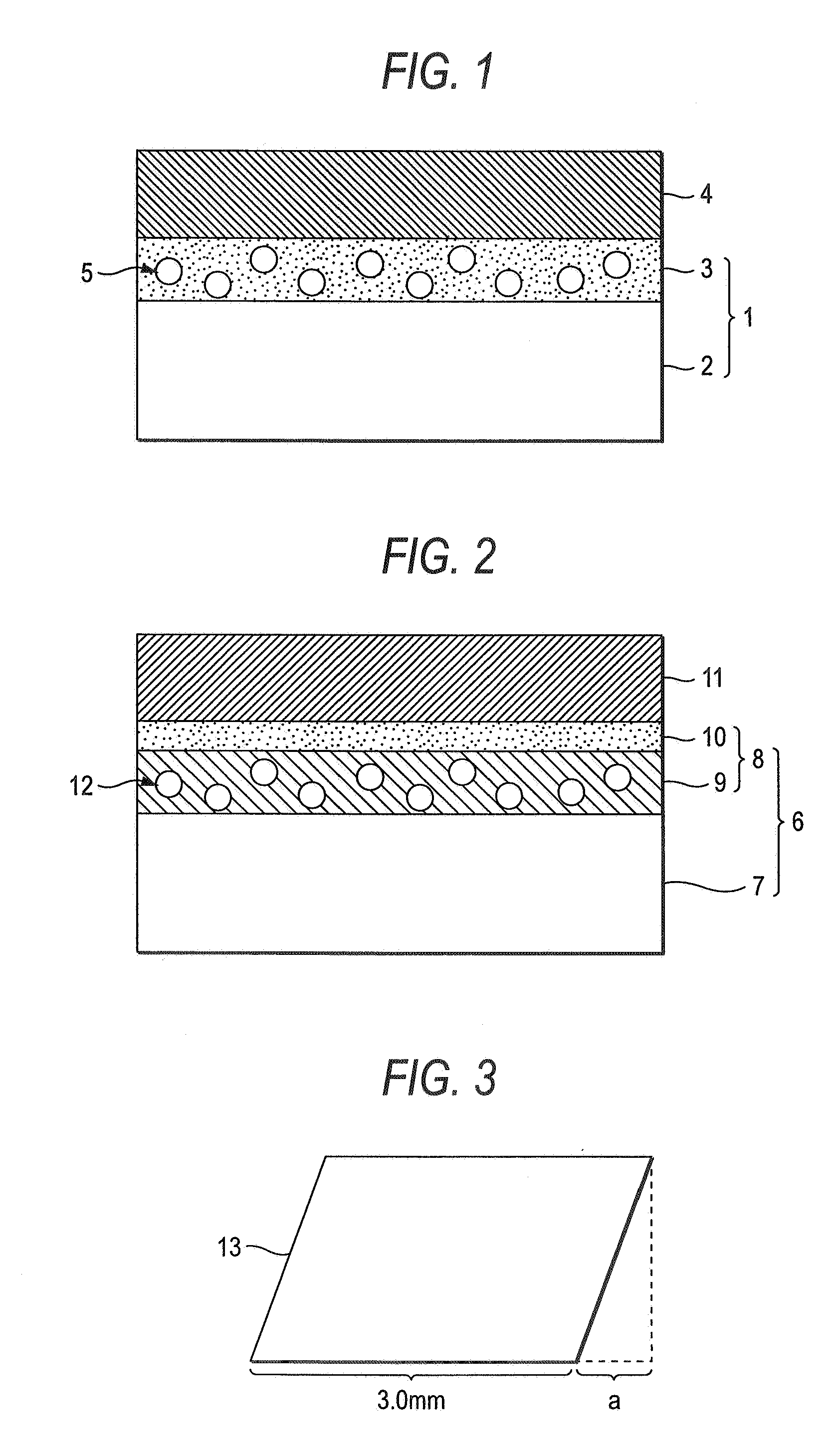Adhesive sheet, process for producing the same, and method of cutting multilayered ceramic sheet
- Summary
- Abstract
- Description
- Claims
- Application Information
AI Technical Summary
Benefits of technology
Problems solved by technology
Method used
Image
Examples
examples 1 and 2
(6) Heat Peelability from Glass Plate (Examples 1 and 2 and Comparative Examples 1 and 2)
[0134]Adhesive sheets each applied to a glass plate in the same manner as in (4) above were heated at 130° C. for 3 minutes with a thermostatic chamber (hot-air drying oven) (“SPH-2011” manufactured by Espec Corp.). The adhesive sheets which, after the heating, peeled off the glass plate by themselves are indicated by good, while those which did not peel off by themselves are indicated by poor.
(7) Accuracy of Cutting of Multilayered Ceramic Sheet (Examples 3 to 8)
[0135]The adherent-layer side of each of the adhesive sheets obtained in Examples 3 to 8 was applied to a multilayered ceramic sheet on a 40° C. hot plate with a rubber roller. Thereafter, the ceramic sheet was cut under the following conditions.
[0136]A section of a chip obtained by the cutting was examined with an optical microscope. The cutting accuracy Q (%) was calculated from an oblique-cutting amount a (mm) in the cut chip shown i...
example 1
Preparation of Heat-Expandable Microspheres A′
[0149]Heat-expandable microspheres A (trade name “Matsumoto Microsphere F50D”, manufactured by Matsumoto Yushi-Seiyaku Co., Ltd.; expansion initiation temperature, 120° C.; mode diameter, 13.4 μm; maximum particle diameter, 51.2 μm) were dispersed in pure water to prepare a 30% aqueous dispersion thereof. This dispersion was subjected to three-stage filtration through filters (trade name “CP-10”, manufactured by Chisso Filter Co., Ltd.; nominal filtration accuracy, 10 μm) (arranged serially) to obtain an aqueous dispersion of heat-expandable microspheres A′. The aqueous dispersion of heat-expandable microspheres A′ obtained was examined for particle size distribution, and the results obtained are shown in Table 1.
[0150](Adhesive Sheet)
[0151]A toluene solution containing 100 parts by weight of a 2-ethylhexyl acrylate / ethyl acrylate / methyl methacrylate / 2-hydroxyethyl acrylate copolymer pressure-sensitive adhesive (monomer proportion (by we...
example 2
[0153]An adhesive sheet (heat-peelable adhesive sheet) was obtained in completely the same manner as in Example 1, except that the adherent-layer thickness was changed to 38 μm.
PUM
| Property | Measurement | Unit |
|---|---|---|
| Thickness | aaaaa | aaaaa |
| Thickness | aaaaa | aaaaa |
| Diameter | aaaaa | aaaaa |
Abstract
Description
Claims
Application Information
 Login to View More
Login to View More - R&D
- Intellectual Property
- Life Sciences
- Materials
- Tech Scout
- Unparalleled Data Quality
- Higher Quality Content
- 60% Fewer Hallucinations
Browse by: Latest US Patents, China's latest patents, Technical Efficacy Thesaurus, Application Domain, Technology Topic, Popular Technical Reports.
© 2025 PatSnap. All rights reserved.Legal|Privacy policy|Modern Slavery Act Transparency Statement|Sitemap|About US| Contact US: help@patsnap.com


